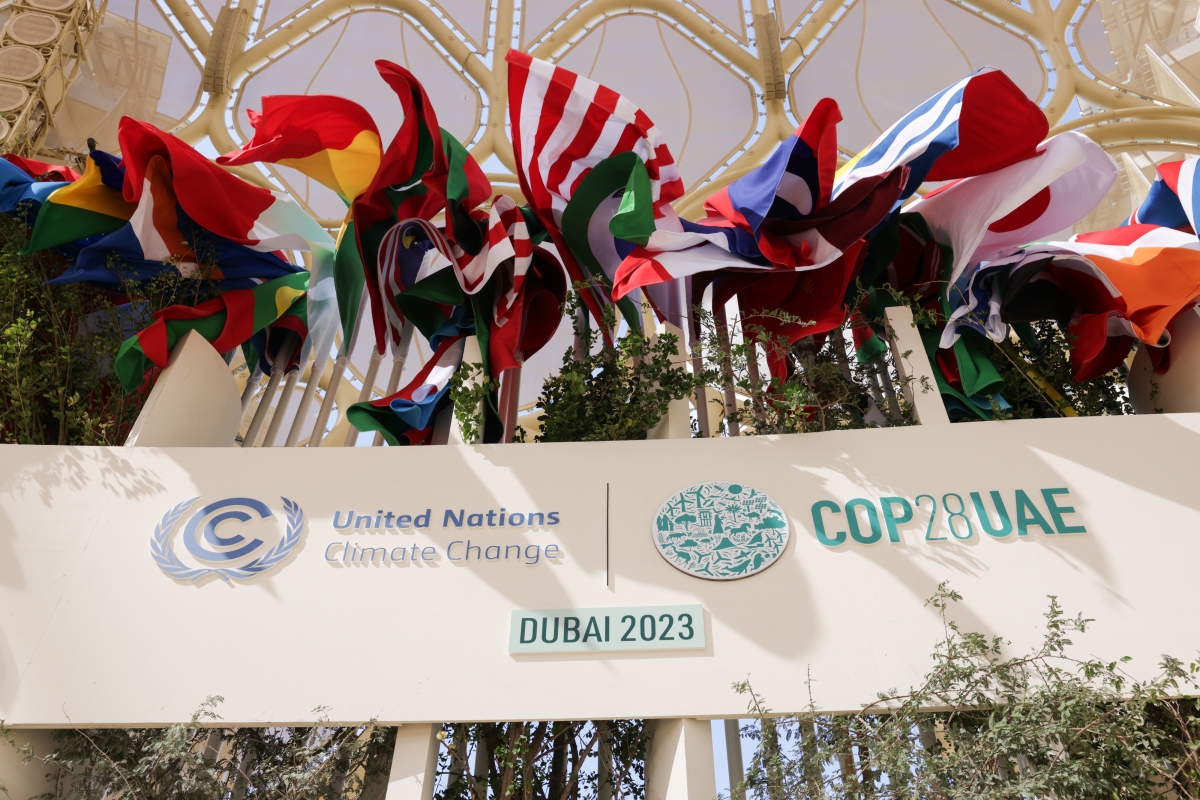Asia at COP28: Tracking the Region’s Climate Ambition

By Meera Gopal and Betty Wang
The United Nations Climate Conference, known as the Conference of the Parties (COP), takes place annually under the UN Framework Convention on Climate Change (UNFCCC). This year's COP28, hosted by the United Arab Emirates (UAE) in Dubai, represented an important milestone as it involved the first "global stocktake" (GST) to assess the progress and gaps on climate action since the Paris Agreement and the work that remains to be done. COP28 started off on a high note on November 30, when Parties moved to operationalize the Loss and Damage (L&D) Fund agreed to at COP27. Pledges to the L&D Fund totaled more than $400 million on day one, with initial commitments from the UAE ($100 million), the European Union (EU) ($245 million), Japan ($10 million), the United Kingdom ($50.5 million), and the United States ($17.5 million). This kicked off two weeks of negotiations on a positive note.
Week 1: High-Level Segment and Pledges Galore
During the first two days of COP, designated as the High-Level Segment, attention focused on the World Climate Action Summit (WCAS), which witnessed the gathering of more than 150 heads of state and government (including over 20 countries from the Asia-Pacific region) and 22 other international leaders. Notably, the heads of the world's two largest greenhouse gas (GHG) emitters, Joe Biden and Xi Jinping, were absent from the Summit. Day two of the Summit featured the first G77 + China Summit at a COP. Many countries, including several from the Asia-Pacific region, expressed caution about the proliferation of pledges at the COP and stressed the need to discuss accountability and implementation mechanisms for such pledges and initiatives.
The relationship between climate finance and the need for greater action was one focus of many developing countries at COP28. Developing countries have long expressed their disappointment and lack of trust in developed countries' ability to keep their commitments, and UN Secretary-General António Guterres has stressed the need for transparency about claims that developed countries will finally meet the target to provide $100 billion annually in climate finance in 2023. Some progress on key concerns relating to climate finance was achieved at the WCAS. For instance, the UAE garnered the support of 12 other nations, including India and the Philippines, for the release of the UAE Declaration of Leaders on a Global Climate Finance Framework, which aims to make climate finance available, accessible, and affordable. The Declaration builds on the work of the Independent High-Level Expert Group on Climate Finance headed by Dr. Vera Songwe and Lord Nicholas Stern, which released a flagship second report during COP28. The new report finds that while global climate investment has increased, it is not on track to deliver the scale outlined in the Group's first report. It has particularly stalled in emerging markets and developing countries (EMDCs) other than China.
This year is also the first time that the climate change–health nexus has been highlighted during a COP, with a first-ever thematic day dedicated to health. Fifty health ministers joined the first Climate-Health Ministerial meeting, which focused on the connections between health and current and future climate risks. The ministers heard from groups such as the Global Climate and Health Alliance, which are calling for a phaseout of fossil fuels to help save lives, given the health problems associated with air pollution from fossil fuel production and use. The UAE Climate and Health Declaration has been signed by 123 countries as of December 2. While the Declaration calls for "deep, rapid, and sustained reductions in greenhouse gas emissions," mention of fossil fuels is conspicuously missing. Further, the world's most populous country, India, did not sign the declaration, arguing that short-term targets are impractical and calling for a reduction of GHG use in cooling in the health sector. In addition to the climate and health declaration, 70 states and 39 organizations also backed the UAE Declaration on Climate, Relief, Recovery and Peace.
According to the COP28 Presidency, financial pledges toward loss & damage stood at $725 million at the end of the WCAS. However, one tracker calculated the total pledges to the Fund at around $656 million, meaning that a portion of total pledges will go toward "funding arrangements" outside of the Fund. Interestingly, the UAE and Japan were the only two countries from Asia to pledge contributions. Australia and New Zealand (developed countries in the Asia-Pacific region) have yet to make commitments to the Fund. Australian climate groups urged the government to make appropriate commitments to the Fund, highlighting the country's responsibility as a member of the Loss and Damage Transitional Committee and its developed-nation status.
Despite calls for doubling adaptation finance by 2025 since COP26, South Korea remains the only Asian country to make a pledge to the Adaptation Fund ($0.9 million). This underscores the lack of uniformity across the Asia-Pacific region. While several emerging economies have the capability to contribute, not many countries from Asia have done so.
New Initiatives and Alliances
The high-level segment opened with statements from UAE President Dr. Sultan Al-Jaber and Prime Minister Narendra Modi of India. Simon Stiell, executive director of the UNFCCC, did not mince words in his welcome address, stating "This is not the moment for empty promises, photo-ops," while calling for united and bold action from global leaders.
Over the next two days, Asian leaders led several high-level events focused on critical issues such as fossil fuel phaseout, climate justice, mountain ecosystem protection, and climate finance. Noteworthy initiatives led by Asian countries included the following:
- The UAE, along with the United States and the EU, led a voluntary initiative to triple renewable energy and double energy efficiency by 2030. At least 123 governments have signed on to this pledge. Notably missing from the signatories are India and China, even though both supported language on tripling renewable energy in the G20 leaders' declaration and are well on their way toward meeting such a pledge.
- The UAE and the Kingdom of Saudi Arabia launched the Oil and Gas Decarbonization Charter, wherein 51 companies, including 29 national oil companies (for the first time), pledged net zero emissions by 2050 or before, with 30 committing to near zero methane emissions. However, this initiative covers only Scope 1 and 2 emissions from the industry (i.e., it applies only to these companies' operations). Thus, it still makes space for the continuation of oil and gas production, thereby allowing for the continued trade and consumption of these fossil fuels to increase emissions.
- Sri Lanka launched the Climate Justice Forum, which aims to ensure greater climate justice, accelerate the financing of losses and damages, and provide an alternative and nontraditional approach, including active participation from the private sector. President Ranil Wickremesinghe invited world leaders to join the forum and sought collaboration and active participation from the UN Environmental Programme, the UN Development Programme, and the EU.
- At a high-level event, India launched the Green Credit Initiative, which aims to incentivize eco-friendly actions by granting "green credits" for activities such as afforestation and plantation on degraded lands. This program, envisaged as a fully digital and tradable instrument, seeks to transform global environmental policies by moving beyond the commercial nature of traditional carbon credits. It will operate under the broader Lifestyle for Environment (LiFE) Movement, focusing on water conservation and afforestation in its initial phase. It is not yet clear how this initiative will be operationalized alongside the official and voluntary carbon credit market in India.
- Tuvalu and Vanuatu hosted a high-level event inviting parties to join the Fossil Fuel Non-Proliferation Treaty Initiative and seeking a negotiating mandate on the issue. The event was attended and supported by the World Health Organization. Following the event, Palau and Colombia joined the initiative, followed by Samoa and Nauru on December 4, increasing the number of countries supporting it to twelve.
- Nepal hosted a high-level roundtable on "Mountains and Climate Change." It was attended by several dignitaries, including UN Secretary-General Guterres, who lamented that "Nepal's mountains are crying out for help" and called for actionable outcomes in the GST outcome document on three main issues: climate finance and justice, rapid emissions reduction within this decade, and strengthened international cooperation.
- China co-hosted a summit on methane and non-CO2 GHGs together with the UAE and the United States. The summit garnered over $1 billion in grant funding from governments, businesses, and philanthropies to support the reduction of methane and other non-CO2 GHGs across sectors in developing countries.
Key Highlights from Asian Leaders at the High-Level Segment of COP28
During the high-level segment of COP28, Asian leaders including Indian Prime Minister Modi, Indonesian President Joko Widodo, and Japanese Prime Minister Fumio Kishida articulated their visions and strategies for tackling climate change. The following overview captures the highlights of the numerous initiatives and commitments presented.
UAE
The UAE launched a new climate fund, called ALTÉRRA, and pledged a $30 billion investment to the fund. ALTÉRRA aims to accelerate the energy transition, particularly in the Global South – though it is primarily a profit-seeking entity and will not provide any concessional finance at more favorable interest rates. However, it may help bring down the cost of borrowing in developing countries by investing mostly in high-emitting sectors. This move was coupled with a $200 million commitment in the form of special drawing rights to the International Monetary Fund's Resilience and Sustainability Trust, which supports vulnerable countries facing climate shocks. These early announcements and pledges at COP28, however, must be considered in the broader context of the UAE's climate actions and the statements of its leaders. Sultan Al Jaber's conflicting statements about fossil fuels, including a leaked video where he questioned the science of fossil fuels, have raised concerns about the UAE's actual commitment to climate change mitigation.
Jordan
King Abdullah of Jordan highlighted the Israel-Palestine war and spoke of the environmental impacts of war, including how war exacerbates water and food security threats. He called for inclusivity in climate responses and protection of the most vulnerable. He also highlighted the Climate/Refugee Nexus Initiative, which was launched at COP27 as a forum for countries that are home to significant populations of climate refugees.
India
In his statement, Prime Minister Modi pointed out that India had achieved its emission intensity reduction target 11 years in advance. This early accomplishment, however, is indicative of the initial target's lack of ambition, underscoring the imperative for India to adopt more stringent emissions reduction goals in line with the 1.5°C warming pathway. He also stressed that the energy transition needs to be just, equitable, and innovative, and he put forth a proposal on behalf of India to host COP33 in 2028.
China
Xie Zhenhua, China's Special Envoy on Climate Change, announced that China plans to release its 2035 national climate targets under the Paris Agreement's framework in 2025. Similar to India's stance on the Global South, China's Vice Premier Ding Xuexiang emphasized the importance of protecting the developmental rights of developing countries. China also called for increased solidarity among the G77 + China group to voice common interests and promote sustainable development, climate funding, and the Global Goal on Adaptation.
Bangladesh
Bangladesh the establishment of the Bangladesh Climate and Development Platform in collaboration with several other countries, aid agencies, and development banks. The platform, envisaged to operate as a Project Preparation Facility, is being touted as one of the first of its kind in Asia. It aims to tap into the International Monetary Fund's Resilience and Sustainability Facility, which was recently approved for an initial outlay of $1.4 billion.
Vietnam
Vietnam's latest Resource Mobilization Plan (RMP) under the Just Energy Transition Partnership (JETP) was a significant development announced by Vietnamese Prime Minister Phạm Minh Chinh and the International Partners Group. The JETP-RMP details the allocation of the initially announced $8 billion investment by outlining its investment strategy, and projects an additional $7.5 billion in private sector contributions. Serving as a central framework, the RMP's immediate focus is on efficiently administering JETP, with key programs scheduled for implementation in 2024. The Vietnam JETP is a key development to watch, as it has implications regionally and globally in the context of just energy transitions and post-pandemic growth.
Japan
Japanese Prime Minister Fumio Kishida made a new pledge to end the construction of new unabated coal-fired power plants domestically. This move aligns with international efforts to curb global emissions and the G7's broader commitments to halt unabated coal-fired power generation projects as soon as possible. However, this pledge will not apply to coal power plants that are currently under construction in Japan.
Tonga
King Tupou VI highlighted the outcomes of the recently concluded 52nd Pacific Forum and the establishment of the Pacific Partnership for Prosperity as a political prioritization process to mobilize resources. The monarch also acknowledged the initial commitments by Australia and New Zealand to support the Pacific-led, community resilience facility – the Pacific Resilience Facility.
Week 2: Negotiations, Deadlocks, and a Big Compromise
On the penultimate day of the COP, a draft text was circulated on the global stocktake which framed fossil fuel phaseout as one of several actions that countries "could" take, thereby watering down previously suggested language. This draft was rejected by many parties as being too weak and not in line with the action needed to be 1.5 °C compliant. As a result of this deadlock, the COP was pushed into overtime, with final negotiations continuing into the wee hours of the morning on December 13. Another draft text, introduced in the early morning, showed marginal progression in the language on fossil fuel phaseout. Notably, this draft (referenced in paragraph 28) "calls on" Parties (a term in UN parlance that refers to requests or invites and does not have much binding value) to "contribute to" a list of actions including "transitioning away from fossil fuel in energy systems." However, while coal phasedown language was retained, there was no explicit mention of oil and gas. A crafty loophole was also included which recognized "the role of transitional fuels in facilitating the energy transition" while ensuring energy security. This text was ultimately adopted at the closing plenary session and reflected a big compromise between petrostates and more ambitious coalitions. Several other decisions were also adopted during the closing plenary, notably the framework of the Global Goal on Adaptation, which was received with a high level of disappointment from many developing countries due to weak language around finance and means of implementation.
In his remarks during the closing plenary session, UNFCCC Executive Director Simon Stiell framed the agreement as the "beginning of the end of the fossil fuel era," urging swift actions to translate these pledges into real-economy outcomes without any delay. Representing the Alliance of Small Island States (AOSIS), Samoa expressed its serious concerns with the outcome document, highlighting that while there were some positives, it fell short of necessary measures to meet the 1.5 °C goal. Notably, AOSIS were absent from the plenary hall when the text was adopted since they were busy coordinating, thus raising questions about whether AOSIS had consented to the draft. Samoa also lamented the absence of a definitive timeline to peak global emissions and that the paragraph on fossil fuels gives a "litany of loopholes."
At the same time, Saudi Arabia (on behalf of the Arab group), India, and China stressed the need to respect the principles of common but differentiated responsibilities, equity, and climate justice. They also raised the need for developed countries to reach net zero as soon as possible and deliver financial, technical, and capacity-building support for developing countries. Bangladesh, in emphasizing the significance of this Asia-led COP, also underscored that action on climate finance should be geared toward delivering the resources that are needed – this will be the real test going forward.
Way Forward
The initial days of COP28 saw a number of pledges emerge, signaling an attempt at more ambitious climate action. However, the real test lies in the implementation and scaling of these pledges. Such pledges are voluntary and non-binding, as they lie outside the purview of the UNFCCC. If not backed by transparency and regular reporting, voluntary pledges risk being mere greenwashing, particularly for countries that are still expanding their fossil fuel use. Thus, these pledges would ideally link to the main challenge of implementing the GST by fostering actionable and measurable means of delivering on its key goals.
Pledges made by Asian leaders revealed a dichotomy in the region's climate action. While there were promising developments, such as Japan's pledge to end new unabated coal-fired power plants, the reluctance of key players like India and China to embrace more ambitious global targets reflects a cautious approach to climate leadership, especially among major emerging and developing economies. This is indicative of COP's persistent challenge of reaching a consensus on difficult topics like fossil fuel phaseout and energy transition. Without implementation, the mere promises made by leaders are not enough to keep the goals of the Paris Agreement alive. This reality highlights gaps in commitment from Asian economies and the need for more ambitious and concrete actions. As noted by Pakistan in the closing ceremony, it is in the hopes of all that countries could do more and respect other countries' needs – "[the] journey from rhetoric to reality is difficult but not impossible."

